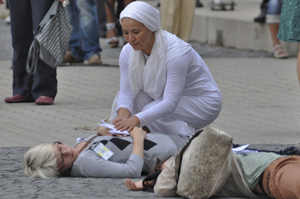
|
|
Commemorative Act Genbaku No Hi in remembrance of the destruction of Hiroshima and Nagasaki in August 1945 held at the Vienna International Centre ( more... ) |
Since nuclear weapons testing began in the mid-twentieth century, with the first test in 1945, nearly 2,000 have taken place. There has been little consideration of the devastating effects of testing on human life, let alone the understanding of nuclear fallout from atmospheric tests. Early on, having nuclear weapons was a measure of scientific sophistication or military might. Hindsight and history have shown us the terrifying and tragic effects of nuclear weapons testing, especially when controlled conditions go awry, and in light of today's nuclear weapons which are far more powerful and destructive Subsequent incidents world-wide have provided compelling reasons for the need to observe the International Day against Nuclear Tests - a day in which educational events, activities and messages aim to capture the world's attention and underscore the need for a unified attempt in preventing further nuclear weapons testing.
The 64th session of the United Nations General Assembly declared 29 August as the International Day against Nuclear Tests through the adoption of resolution 64/35 on 2 December 2009 with the aim of promoting the idea that "every effort should be made to end nuclear tests in order to avert devastating and harmful effects on the lives of people."
The international instrument to put an end to all forms of nuclear testing is the 1996 Comprehensive Nuclear-Test-Ban Treaty (CTBT), which has however yet to enter into force. More....
Message of the Secretary-General: "Nuclear Tests Remain a Threat to Human Health and Global Stability", Message on the International Day Against Nuclear Tests, 29 August 2012
For an overview of the UN system's work in the field of nuclear disarmament and non-proliferation, please visit the UNODA website.